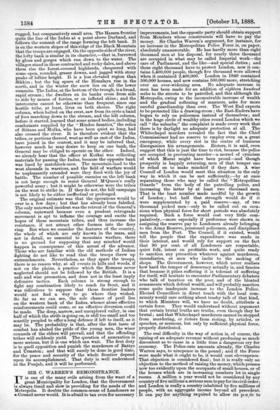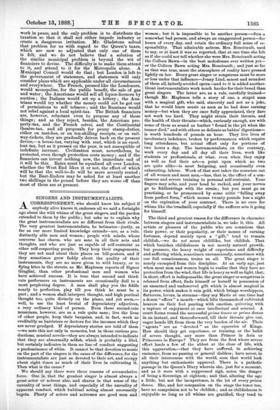SIR C. WARREN'S REMONSTRANCE.
TT is one of the many evils arising from the want of a 1_ great Municipality for London, that the Government is always timid and slow in providing for the needs of the Metropolis. It doubts the common-sense of Londoners as C ouucil never would. It is afraid to tax even for necessary improvements, lest the opposite party should obtain support from Members whose constituents will have to pay the money. Sir Charles Warren's argument, for instance, for an increase in the Metropolitan Police Force is, on paper, absolutely unanswerable. He has hardly more than eight thousand men at his disposal, for nearly three thousand are occupied in what may be called Imperial work—the care of Parliament, and the like—and special duties ; and these eight thousand have to protect London, now it con- tains 5,400,000 people, though five thousand were allowed when it contained 2,400,000. London in 1849 contained 500,000 houses, and now contains 500,000 more, stretching over an ever-widening area. No adequate increase in men has been made for an addition of eighteen hundred miles to the streets to be patrolled, and this although the Metropolis, owing to the inconceivable increase of wealth and the gradual softening of manners, asks for more careful guardianship than ever. The West End expects to be protected like a drawing-room • the East-Enders have begun to rely on policemen instead of themselves ; and in the huge circle of wealthy cities round London which we call "the suburbs," the complaint is made every week that there is by daylight no adequate protection at all. The Whitechapel murders revealed the fact that the Chief Commissioner had no reserve to employ even on a great emergency, while every riot in the centre of business disorganises his arrangements. Rioters, it is said, even suggest that this is just the time to riot, because the police are occupied in preventing murder—a morsel of cynicism of which Marat might have been proud—and though prosperity is happily returning, men of that temper can be relied on to make mischief if they dare. A wise Council of London would meet this situation in the only way in which it can be met sufficiently,—by at once separating those who may be called the "Metropolitan Guards" from the body of the patrolling police, and increasing the latter by at least two thousand men. That is the least number made needful by the growth of London ; but half that strength would do if it were supplemented by a paid reserve—say, of two thousand picked men—only to be called out on occa- sions when physical force for short periods was absolutely required. Such a force would cost very little com- paratively,—more especially if preference were shown in assigning the reserve pay to Londoners already belonging to the Army Reserve, pensioned policemen, and disciplined men from the Port. The Council, if it existed, would tell the people that the expenditure was made in their interest, and would rely for support on the fact that 90 per cent. of all Londoners are respectable, quiet folk, intent on profitable work, and quite ready to sanction any precaution whatever against murderers, incendiaries, or men who incite to the sacking of shops. The Government, however, which never realises how hard, the temper of democracy actually is, and fancies that because it pities suffering it is tolerant of suffering for itself, will hesitate to encounter Parliamentary debaters who talk of taxation on the poor, and of the bloated armaments which defend wealth, and will probably sanction some quite inadequate increase to the London Police. Elected Councillors in direct touch with the local com- munity would care nothing about trashy talk of that kind, to which Ministers will, we have no doubt, attribute a certain force. They would understand without argument that certain brutal truths are truths, even though they be brutal ; and that Whitechapel murderers cannot be stopped from murdering, or rioters from rioting, by articles, or speeches, or sermons, but only by sufficient physical force, properly distributed.
The real difficulty in the way of action is, of course, the raising of an adequate revenue without producing so much discontent as to cause in a little time a dangerous cry for economy. The Police-rate amounts already, Sir Charles Warren says, to ninepence in the pound ; and if the Force were made what it ought to be, it would cost elevenpence. That objection is considered final ; but it is really only an objection to the method of raising the money, which presses now too evidently upon the occupants of small houses, or of the houses which are in increasing numbers let in single rooms. A million a year would not be considered by any country of five millions a serious sum toy for its civil order; and London is really a country inhabited by five millions of people, with an aggregate income beyond all precedent. It can pay for anything reluired to allow its pt o2le to work in peace, and the only problem is to distribute the taxation so that it shall not either impede industry or create a dangerous irritation. Mr. Gladstone solved that problem for us with regard to the Queen's taxes, which are now so adjusted that only one of them is felt, and we do not believe that a solution of the similar municipal problem is beyond the wit of financiers to devise. The difficulty is to make them attend to it, and attend to it for the Metropolis alone. A Municipal Council would do that ; but London is left to the government of statesmen, and statesmen will only consider plans which are applicable under all circumstances and everywhere. The French, pressed like the Londoners, would monopolise, for the public benefit, the sale of gas and water; the Americans would sell all liquor-licences by auction ; the Italians would set up a lottery ; the Aus- trians would try whether the money could not be got out of permissions to sell tobacco ; and the Russians would not rebel against a local spirit-tax. The British financiers are, however, reluctant even to propose any of those things ; and as they reject, besides, the American pro- perty-tax, and the French octroi, and the Continental theatre-tax, and all proposals for penny stamp-duties, either on matches, or on ten-shilling receipts, or on rail- way-tickets, they are gradually driven back on the present device,—a house-tax, varying with rent, which is an excel- lent tax, but as it presses on the poor, is not susceptible of indefinite increase. Civilisation must, nevertheless, be protected, even though protection costs money ; and if the financiers can invent nothing new, the immediate end of it will be this. Rates must be equalised all over London, whether the West End likes it or not, the effect of which will be that the well-to-do will be more severely rented ; but the East-Enders may be asked for at least another two shillings in the pound before they are worse off than most of them are at present.



















































 Previous page
Previous page